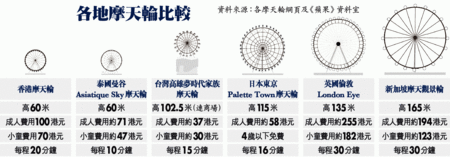
農暦十月十六日。大雪。昨日から少し咳が気になつてゐたが今朝起きるとゲホゲホで最悪。年中無休のC医師の診断受け西薬服用。URTIは上気道感染症で鼻水、くしゃみ、鼻づまり、喉の痛み等、所謂「風邪の諸症状」だがアタシはこれとGastroenteritisの年中繰り返し。咳止め薬で朦朧と寝たり起きたり日曜日。だうにか新聞読みが今日の新聞に追いついた。
▼中環で観覧車もうすぐ営業開始。BTMUの会議室(AIAの9階)から見下ろすくらゐだつたので小さいとは思つてゐたが他都市のそれに比べ見劣り甚し。東京の観覧車が対費用効果ではお得に見えるが速度は倍速で、これでは景色も楽しめない分この料金設定か、と納得。

@fookpaktsuen: What Next for Hong Kong? by Benny Tai URL 戴耀廷、あなたは若者の運動の擁護者でしかなかったのか。
Will China adjust its approach to Taiwan, or to Hong Kong? In the wake of the election even KMT supporters seem less keen on economic co-operation with the mainland. Media in China shrug off Taiwan’s elections as “the chaos of democratic politics”, but have no suggestions for making voters happier. Perhaps it would help if citizens in both places got more of what they wanted. In Taiwan the DPP plans to deliver just that, with such things as virtually free health care for the elderly, welfare for the underprivileged and lots of social housing. (Hong Kong’s leader, Leung Chun-ying, won no sympathy for fretting aloud that “numerical” democracy would tilt policies towards the poor.)
@fookpaktsuen: いったい何のための総選挙なのか URL
Fulfilling these promises would tell the world that Japan was again open for business. But will Mr Abe do it? Cynics point out that he has expressed his enthusiasm for the TPP rather less enthusiastically to domestic audiences than to foreign ones. But he did begin this term in office with considerable flair―far more than the cynics expected. Whatever his inconsistencies, Mr Abe does seem determined to make Japan great, which he cannot do without reviving the economy. Above all, he is running out of time. Unless he pushes ahead with reforms, both Japanese consumers and foreign investors will lose faith in his country’s ability to recover, and disaster will follow. In The Economist’s view he is still Japan’s best bet.
で本編の記事“Moment of reckoning”(こちら)読むと現時点では晋三以外に選択がないのか、としみじみと思はされる。
Mr Abe hopes that public support will help him overwhelm resistance from pressure groups. The extent of this will be difficult to gauge. Many Japanese agree in principle on the need for reforms. Yet they are far less interested in the nitty gritty of implementing them: their immediate impact is often unclear. The media tend to reflect the views of vested interests such as pharmacists, doctors and farmers. And, thanks to a skewed electoral system, the elderly in rural areas, who tend to resist change, have outsized influence. In some parts of Japan, a farmer can have twice the voting clout of a city-dweller because of falling populations in rural districts. On November 26th the Supreme Court ruled that last year’s election for the upper house of the Diet, where disparities are wider still, was held in a state of “unconstitutionality”. Mr Abe has, however, been slow to tackle this.
Some politicians have misgivings about the wisdom of holding a snap poll when Abenomics seems to be in trouble, and grumbling about the economy is rising beyond the capital. “The oil is in the fields already and any wrong-headed comment by the prime minister or his ministers could set it alight,” says one LDP member of the Diet. Voter turnout is likely to be low. But with or without a mandate, it is time for Mr Abe to take up his mission and stake his all on change.